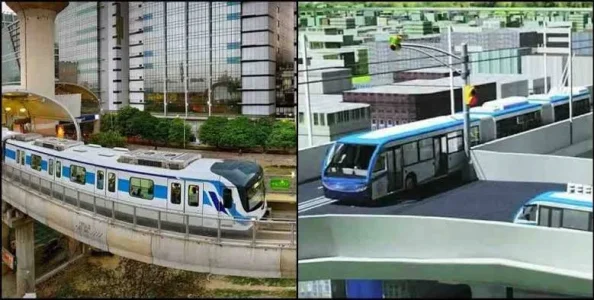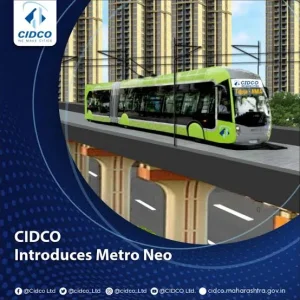And eat up precious narrow roadspace? Its as good or as bad as dedicated bus corridors some cities are having. Good solution would be to have them on via ducts. But once you go via duct route, then tendency is to go for all hog metro as cost benefit ratio favors metro then.i think for less developed nd smaller cities ... government should make less costly "metro neo". that cost near 25-30% of metro system.
View attachment 23669
View attachment 23670
You are using an out of date browser. It may not display this or other websites correctly.
You should upgrade or use an alternative browser.
You should upgrade or use an alternative browser.
Indian Economy (23 Viewers)
- Thread starter haldilal
- Start date
More options
Who Replied?- Joined
- Jul 7, 2024
- Messages
- 1,273
- Likes
- 4,346
lol....they want cheap workers desperately, but also dont want to upset their people by hiring regular indians. which get bad reputation in between taiwanese by western medias. western media is followed in korea, japan, thailand etc, thats why racism against indian is increasing there...chinese r our enemy, so they obviously dont like us. next countries who r soon going racist against indian will be indonesia, Phillipines nd vietnam. coz they r also consuming western news, social media etc lot.Really hope racist island of Taiwan gets nuked by china
https://indianexpress.com/article/i...alks-on-with-northeastern-states-9806702/lite
Why Taiwan wants to hire workers from the Northeastern states under the new labour pact with India
Sources in Taiwan said Taipei has expressed a preference to hire these workers from India's northeastern states, citing cultural similarities and easy assimilation.
Last edited:
- Joined
- Jul 7, 2024
- Messages
- 1,273
- Likes
- 4,346
they can be build on dedicated flyover also.And eat up precious narrow roadspace? Its as good or as bad as dedicated bus corridors some cities are having. Good solution would be to have them on via ducts. But once you go via duct route, then tendency is to go for all hog metro as cost benefit ratio favors metro then.


if you are going for pillars better go for all hog metro. Or plan it in such a way initially you can run hybrid articulated buses when population density and ridership is relatively low. Once density/ridership goes up - convert to metro.
There seems to be an inability to think independently in these countries, with exceptions of course.lol....they want cheap workers desperately, but also dont want to upset by hiring regular indians. which get bad reputation in between taiwanese by western medias. western media is followed in korea, japan, thailand etc, thats why racism against indian is increasing there...chinese r our enemy, so they obviously dont like us. next countries who r soon going racist against indian will be indonesia, Phillipines nd vietnam. coz they r also consuming western news, social media etc lot.
- Joined
- Jul 7, 2024
- Messages
- 1,273
- Likes
- 4,346
well atleast in uttarakhand we can make three neo metro project in dehradun, rishikesh nd haridwar. may be due to its cost nd lighter weight.if you are going for pillars better go for all hog metro. Or plan it in such a way initially you can run hybrid articulated buses when population density and ridership is relatively low. Once density/ridership goes up - convert to metro.

देहरादून में सात सालों में नियो मेट्रो का सफर कहां तक पहुंचा, क्यों हो रहा लेट?, यहां जानें पूरा अपडेट - What is the status of Dehradun Metro Project
देहरादून मेट्रो प्रोजेक्ट के भविष्य पर संशय के बादल मंडरा रहे हैं। राज्य सरकार वित्तीय चिंताओं के कारण मेट्रो चलाने के निर्णय से कतरा रही है। अब तक 80 करोड़ रुपये खर्च हो चुके हैं लेकिन प्रोजेक्ट की उपयोगिता पर सवाल उठ रहे हैं। सात साल हो गए लेकिन सरकार अभी तक फैसला नहीं ले पाई है। जानिए इस...
www.jagran.com
- Joined
- Jun 27, 2024
- Messages
- 961
- Likes
- 6,861
Really hope racist island of Taiwan gets nuked by china
https://indianexpress.com/article/i...alks-on-with-northeastern-states-9806702/lite
Why Taiwan wants to hire workers from the Northeastern states under the new labour pact with India
Sources in Taiwan said Taipei has expressed a preference to hire these workers from India's northeastern states, citing cultural similarities and easy assimilation.
Northeast is probably the most unproductive & useless region in our country that keeps sucking up tax revenue. So if we can offload parts of them somewhere else, it's ok. These ooga booga tribals/cookies and others etc can self deport themselves. Doesn't really matter that much.
And Taiwan's work culture is just as brutal as SK, not really an ideal place.
- Joined
- Jul 1, 2024
- Messages
- 1,702
- Likes
- 13,776
This budget is against women, youth, students, farmers, Muslims,Christians, other minorities, Tamilians, Manipuris, Punjabis, South Indians, LGBTQIA+, intellectuals, influencers, progressives,Youtubers, journalists, dissenters, dravidians, Jats, SCs, STs, OBCs & only cater to crony capitalists like Adani.
- Joined
- Jul 1, 2024
- Messages
- 1,771
- Likes
- 9,660
Urban metro systems may or may not generate direct profits, but they contribute to economic growth by benefiting businesses and individuals. This leads to increased consumption, higher tax revenues, and long-term economic gains. Even if a metro system is not immediately profitable, it will become viable over time as cities expand and populations grow.
After the Patna Metro, Bihar cabinet gave nod to metro projects in Bhagalpur, Muzaffarpur, Gaya, and Darbhanga. critics argue that the government should first focus on widening roads and building flyovers before investing in metro systems. This argument is flawed both roads and metro rail are essential for urban infrastructure; it is not a question of choosing one over the other.
China, has extended its high-speed rail corridor to Tibet despite knowing that it would not be immediately profitable, a long-term vision for infrastructure development.
Bihar, Bhagalpur, Muzaffarpur, Gaya, and Darbhanga
None of the cities required Metro in first place.
Bhagalpur have an population of 4L based on 2011 census. Even my hometown have 9L based on 2011 census. Still I don't want to have an Metro.
None of the cities need metro. A simple bus service will be enough. Lot of soviet cities still relies on Bus service which is reliable. Indian cities needs to do city planning to get an proper roads, you cannot implement any good transit since cities were build haphazard.
Currently Hyderabad needs to start its phase two.
- Joined
- Jul 1, 2024
- Messages
- 1,771
- Likes
- 9,660
Northeast is probably the most unproductive & useless region in our country that keeps sucking up tax revenue. So if we can offload parts of them somewhere else, it's ok. These ooga booga tribals/cookies and others etc can self deport themselves. Doesn't really matter that much.
And Taiwan's work culture is just as brutal as SK, not really an ideal place.
BHIMARU grabbed the limelight while Kashmir and Northeast states get an free pass. But if you see before Babaji period we can see how poor Infrastructure there in Northeast region which results in free hand for all terror UNGA BOONGA tribes. With access is coming in the form of Highways and Railways, tourism is coming up, better movement of goods, Faster response to Unga boonga tribe attacks.
With Assam getting the Semicon OSAT, we can see this may catapult the region with various support industries.
- Joined
- Jul 1, 2024
- Messages
- 814
- Likes
- 3,196
only state in India which competes with "lahori chooran" is bihar. first they need proper roads then they should talk about proper public transport like buses and maybe in next century should start dreaming of metros.Bihar, Bhagalpur, Muzaffarpur, Gaya, and Darbhanga
None of the cities required Metro in first place.
Bhagalpur have an population of 4L based on 2011 census. Even my hometown have 9L based on 2011 census. Still I don't want to have an Metro.
None of the cities need metro. A simple bus service will be enough. Lot of soviet cities still relies on Bus service which is reliable. Indian cities needs to do city planning to get an proper roads, you cannot implement any good transit since cities were build haphazard.
Currently Hyderabad needs to start its phase two.
most cities/towns in bihar are aligned along a single fking road that too ranges from 0.8 lane to 1.15 lane to rarely 2.3 lane.
Are they really considering building a metro on the only road they have?


- Joined
- Jul 1, 2024
- Messages
- 1,771
- Likes
- 9,660
only state in India which competes with "lahori chooran" is bihar. first they need proper roads then they should talk about proper public transport like buses and maybe in next century should start dreaming of metros.
most cities/towns in bihar are aligned along a single fking road that too ranges from 0.8 lane to 1.15 lane to rarely 2.3 lane.
Are they really considering building a metro on the only road they have?

Again this is not a Bihar only problem. All Indian cities were glorified swamps where there is no concept of building something sensible.
At present something like Force Urbania, Travellor will support the narrow areas compared to AL, Tata buses.
- Joined
- Nov 20, 2024
- Messages
- 972
- Likes
- 5,041
Developing an expressway network across Bihar would boost the state’s economy more than city metro projects. However, it is more expensive, challenging, and does not attract as much public attention as metro construction. If Bihar state government were to inaugurate even a small metro network in cities like Darbhanga, Bhagalpur, Muzaffarpur, or Gaya, they would heavily promote it during elections to gain public attention and, ultimately, votes.Bihar, Bhagalpur, Muzaffarpur, Gaya, and Darbhanga
None of the cities required Metro in first place.
Bhagalpur have an population of 4L based on 2011 census. Even my hometown have 9L based on 2011 census. Still I don't want to have an Metro.
None of the cities need metro. A simple bus service will be enough. Lot of soviet cities still relies on Bus service which is reliable. Indian cities needs to do city planning to get an proper roads, you cannot implement any good transit since cities were build haphazard.
Currently Hyderabad needs to start its phase two.
My dream is to see Delhi, Patna, and Kolkata connected by a Dedicated Freight Corridor, expressways, and a high-speed rail corridor as soon as possible. However, this is an extremely complex task due to India’s challenging land acquisition process, which becomes even more difficult in West Bengal.
- Joined
- Jun 30, 2024
- Messages
- 3,287
- Likes
- 28,625
Why? I think it is good even if racist. Will help North East get some sweet remittance money from abroad. And given the amount of mess pakroaches and kangladeshits have created abroad, it has taken a toll on brown Indians as well.Really hope racist island of Taiwan gets nuked by china
https://indianexpress.com/article/i...alks-on-with-northeastern-states-9806702/lite
Why Taiwan wants to hire workers from the Northeastern states under the new labour pact with India
Sources in Taiwan said Taipei has expressed a preference to hire these workers from India's northeastern states, citing cultural similarities and easy assimilation.
- Joined
- Dec 26, 2024
- Messages
- 116
- Likes
- 398
let HSR prove to be profitable by connecting the richer states first. Maharashtra -> Karnataka -> TN -> Gujarat.Developing an expressway network across Bihar would boost the state’s economy more than city metro projects. However, it is more expensive, challenging, and does not attract as much public attention as metro construction. If Bihar state government were to inaugurate even a small metro network in cities like Darbhanga, Bhagalpur, Muzaffarpur, or Gaya, they would heavily promote it during elections to gain public attention and, ultimately, votes.
My dream is to see Delhi, Patna, and Kolkata connected by a Dedicated Freight Corridor, expressways, and a high-speed rail corridor as soon as possible. However, this is an extremely complex task due to India’s challenging land acquisition process, which becomes even more difficult in West Bengal.
- Joined
- Jun 27, 2024
- Messages
- 1,571
- Likes
- 7,570
They can have our Christians. Hindus are a no go.Really hope racist island of Taiwan gets nuked by china
https://indianexpress.com/article/i...alks-on-with-northeastern-states-9806702/lite
Why Taiwan wants to hire workers from the Northeastern states under the new labour pact with India
Sources in Taiwan said Taipei has expressed a preference to hire these workers from India's northeastern states, citing cultural similarities and easy assimilation.
- Joined
- Nov 20, 2024
- Messages
- 972
- Likes
- 5,041
The Delhi-Patna-Kolkata corridor is the second most profitable route for a high-speed rail network, after the Delhi-Ahmedabad-Mumbai corridor.let HSR prove to be profitable by connecting the richer states first. Maharashtra -> Karnataka -> TN -> Gujarat.
This route was selected based on a feasibility study, and it also aligns with the Eastern Dedicated Freight Corridor.
- Joined
- Jul 1, 2024
- Messages
- 1,948
- Likes
- 11,605
HSR does not need to be 'profitable'.let HSR prove to be profitable by connecting the richer states first. Maharashtra -> Karnataka -> TN -> Gujarat.
if you are going for pillars better go for all hog metro. Or plan it in such a way initially you can run hybrid articulated buses when population density and ridership is relatively low. Once density/ridership goes up - convert to metro.
That is the plan.
- Joined
- Sep 29, 2024
- Messages
- 5,058
- Likes
- 27,645
They can have our Christians. Hindus are a no go.
They wanted Christians from NE only, that is why it became a scandal many months ago, this "preference" was announced by one of their ministers on live TV.
Anyway the oogah-boogahs can make themselves useful this way by sending remittances.
If a "pipeline" is established for exporting the oogah boogahs like Mallus are forced to export themselves, hopefully we can add some "diversity" to their states to prevent out of control oogah boogah insurgencies in the future.
Users who are viewing this thread
Total: 17 (members: 6, guests: 11)

Latest Replies
-
-
Indo China Relations
- jaijaganath
-
Indian Army: News and Updates
- jaijaganath
-
Operation Sindoor and Aftermath
- jaijaganath
-
Israel x Iran Conflict
- shade2
-
Chinese Economy Watch
- Azaad
-
Indian Economy
- ezsasa
-
Indian Special Forces
- COLDHEARTED AVIATOR
-
Indian Air Force: News & Discussions
- redpanda


